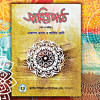The boundless possibilities of books

Books are often staple travel companions. But as the reader leafs through its pages, they are blanketed by the warmth of its faint-yet-familiar scent, and submerged into a linguistic hinterland hiding infinite possibilities. As pages and letters metamorphose into a world unfettered by human limitations, books become much more than mere companions we literally travel with. Rather, they are transfigured into vehicles through which we embark on a more figurative journey—one of the intellect and the imagination.
In the classic modernist bildungsroman, The Portrait of the Artist as a Young Man (1916) by James Joyce, the reader witnesses young Stephen's soul-searching journey of self-growth on the path to becoming an independent artist. The novel recounts a spiritual odyssey, autobiographical in its parallels with Joyce's own life. For instance, it ends as Stephen is about to begin his journey away from home, with the beautiful note "O Life! I go to encounter for the millionth time the reality of experience and to forge in the smithy of my soul the uncreated conscience of my race"—echoing Joyce's own relationship as an artist, with his Irish origin.
Traversing time, space, and continents, let us zoom in on "When Mr. Pirzada Came to Dine" (1991), a short story by Jhumpa Lahiri that concerns itself with the tense concoction of American and Bengali culture.
Traversing time, space, and continents, let us zoom in on "When Mr. Pirzada Came to Dine" (1991), a short story by Jhumpa Lahiri that concerns itself with the tense concoction of American and Bengali culture. It is narrated by 10-year old Lilia, daughter of Indian immigrants to America. Although the whole story is physically set in their serene house in Boston, the turbulent Dhaka of 1971 and a Bangladesh in the throes of its birth are the central components of its setting. This is because the lives and habits of Lilia's family and their visitor, Mr. Pirzada, become dictated by the Liberation War, which they apprehensively view together through a television screen. Mr. Pirzada, a Muslim scholar in America with a family back home in Dhaka, is invited to dine with the Indian family. Without a television in his own dormitory, he routinely visits the Hindu household, "bearing confections in his pocket and hopes of ascertaining the life or death of his family." More so, Mr. Pirzada's visits to seek refuge appear representative of how the people of East Bengal travelled to India for refuge during the war.
Thus, this story presents the home as a transnational space—a third space. A small house somewhere in Boston, America, is transmuted into a multi-cultural space that defies the divisive demarcation of the 1947 Partition of India which cracked the country into two and fomented communal violence. Yet, in the said third space, "the three of them [Lilia's mother, father, and Mr. Pirzada] operat[ed] during that time [of Bangladesh's independence] as if they were a single person, sharing a single meal, a single body, a single silence, and a single fear." On good days, they ate "mincemeat kebabs with coriander chutney" and, during the grave days of war, they observed an austere diet of nothing "other than boiled eggs with rice." Food becomes an integral literary device that depicts the waves of emotions sweeping through the lives of the inhabitants of this third space. In doing so, food constructs the multicultural or, in the words of scholar Homi Bhabha, the "hybrid" nature of the third space itself. The family's erratic changes in diet, attuned with the tumultuous political environment of a nation continents apart, reflect also the "pregnant chaos" characteristic of Bhabha's third space.
At one point during the nationwide curfew and internet shutdown, I restlessly resorted to a reread of "Travels in Ceylon" (1982)—Michael Ondaatje's absurd-yet-bittersweet short story about tales of his alcoholic father's drunken train rides throughout Sri Lanka, during which he once uncovered a Japanese bomb and, thereby, saved the train. Ondaatje uses such narratives of travel to construct a kaleidoscopic memoir of a "picture-perfect" family—with all its blotches and individual idiosyncrasies. Owing to its total detachment from my disturbing physical reality, the story offered scope for figurative travel at a time when physical movement was restricted. Trapped within the four walls of my room, silenced by a tyrannical regime, I leafed through the pages of Ondaatje's narrative and was transported, only if for a moment, to distant shores devoid of walls that threaten to close in on me. Instead, I was swayed by the honey-dipped-humour of his tale, as if floating weightlessly upon the whims of a wave—cresting and crashing—until finally the story ended, and with it, cracked the outer crust of my reverie.
All in all, the works of fiction discussed in this piece offer a multi-faceted overview, or rather, merely a glimpse into the boundless, figurative journey that one can embark on through books. From hops and leaps through time and space, to dives, in and out of minds and bodies, books come to embody hope in times of crisis. To those willing to listen to its tales, a book offers ambrosia for the intellect. I hope you will forgive me for not being able to resist the temptation to conclude an essay with a quote but—hear me out—the vocals on Frank Ocean's song "White Ferrari" fades out with the following note: "You dream of walls that hold us in prison / It's just a skull, least that's what they call it / And we're free to roam." This highlights the arbitrariness of words that limit – such as "skull" —and thus, the constructedness of such limitations. At the end of the day, what are books but vehicles that whisper promises of endless possibilities, broaden the horizons of your mind, and give you freedom to roam?
Syeda Fatema Rahman is an undergraduate student majoring in literature at the Department of English and Modern Languages, North South University. Reach her at [email protected].

 For all latest news, follow The Daily Star's Google News channel.
For all latest news, follow The Daily Star's Google News channel. 








Comments